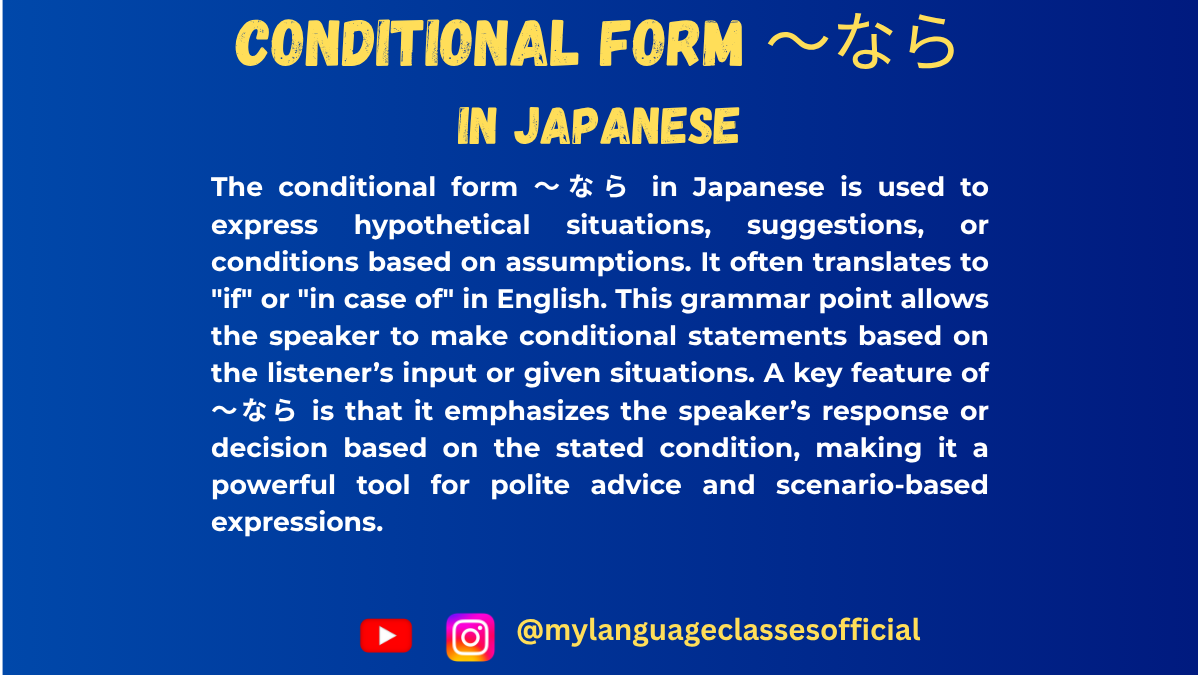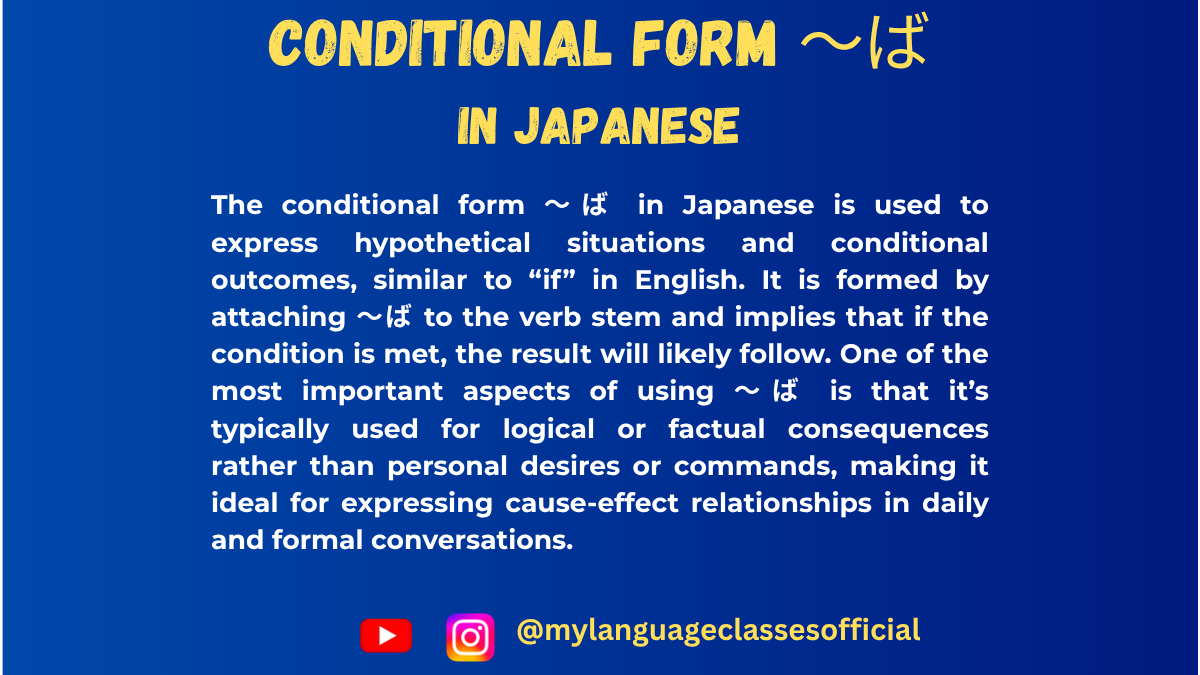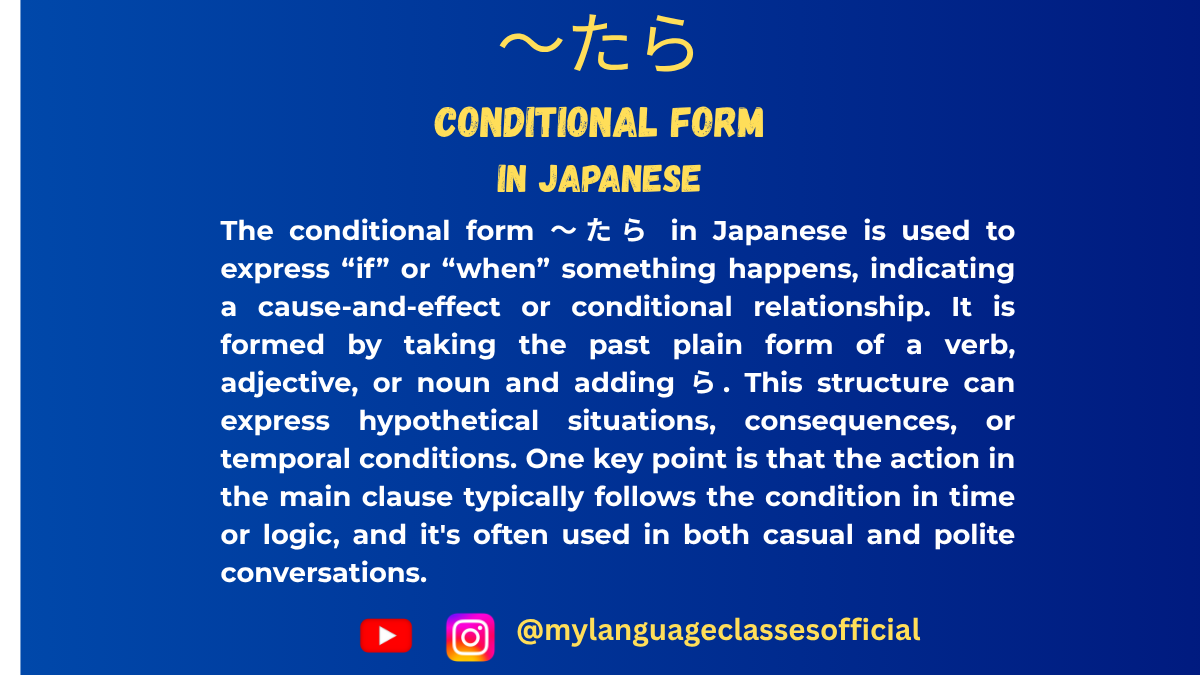Your cart is currently empty!
Tag: conditional sentences in Japanese
-

Using 〜なら for hypothetical situations | My Language Classes
〜なら: Expressing “If” or “As for” in Japanese
In Japanese, 〜なら is a versatile grammar structure often used to express conditionality (“if”) or to provide contextual emphasis (“as for”). This blog post will explore its usage in various contexts and provide a comprehensive list of situations where 〜なら is applicable.
What is 〜なら?
The particle なら is derived from the verb 成る (なる), which means “to become.” In grammar, it functions as a conditional marker or a topic-related particle depending on the context. It is commonly attached to the plain form of verbs, nouns, or adjectives.
Usage of 〜なら
1. Conditional “If”
- Meaning: Expresses a hypothetical or conditional situation.
- Structure:
Clause A (plain form) + なら, Clause B
Clause B often represents the speaker’s judgment, advice, or consequence.
Examples:
- 日本に行くなら、富士山を見たほうがいいですよ。
(Nihon ni iku nara, Fujisan o mita hō ga ii desu yo.)
If you’re going to Japan, you should see Mt. Fuji. - 雨が降るなら、外出しないほうがいいです。
(Ame ga furu nara, gaishutsu shinai hō ga ii desu.)
If it rains, you shouldn’t go out.
2. Topic-Based “As for”
- Meaning: Indicates that a specific topic is being addressed in response to a preceding statement or question.
- Structure:
Noun + なら
Examples:
- 映画なら、コメディが一番好きです。
(Eiga nara, komedi ga ichiban suki desu.)
As for movies, I like comedies the best. - この本なら、もう読んだことがあります。
(Kono hon nara, mō yonda koto ga arimasu.)
As for this book, I’ve already read it.
3. Contrasting Ideas
- Meaning: Suggests a contrast between two different ideas or topics.
- Structure:
Noun/Adjective/Verb + なら
Examples:
- 英語なら話せますが、フランス語は話せません。
(Eigo nara hanasemasu ga, Furansugo wa hanasemasen.)
If it’s English, I can speak it, but I can’t speak French. - 安いなら買いますが、高いなら買いません。
(Yasui nara kaimasu ga, takai nara kaimasen.)
If it’s cheap, I’ll buy it, but if it’s expensive, I won’t.
4. Hypothetical Suggestions
- Meaning: Used when giving suggestions or advice based on hypothetical conditions.
- Structure:
Clause + なら
Examples:
- 東京に行くなら、スカイツリーを訪れるべきです。
(Tōkyō ni iku nara, Sukaitsurī o otozureru beki desu.)
If you’re visiting Tokyo, you should check out the Skytree. - 勉強するなら、早めに始めたほうがいいですよ。
(Benkyō suru nara, hayame ni hajimeta hō ga ii desu yo.)
If you’re going to study, it’s better to start early.
5. Clarifications or Conditions
- Meaning: Used when responding to a condition or clarifying information.
- Structure:
Noun + なら
Examples:
- 山田さんなら、もう帰りましたよ。
(Yamada-san nara, mō kaerimashita yo.)
If you’re talking about Yamada-san, he’s already gone home. - 駅なら、この道をまっすぐ行けば着きます。
(Eki nara, kono michi o massugu ikeba tsukimasu.)
If you mean the station, go straight down this road.
When to Use 〜なら?
Here is a quick checklist of situations where 〜なら is appropriate:
- Making a Hypothetical Conditional Statement:
“If you’re going to X, then Y.” - Responding to Questions or Comments with Context:
“As for X, Y applies.” - Contrasting Two Scenarios or Topics:
“If X is true, Y. But if not, Z.” - Providing Advice Based on Hypothetical Situations:
“If you’re considering X, then Y is a good idea.” - Clarifying or Confirming a Specific Topic:
“If you’re talking about X, then Y.”
Tips for Using 〜なら
- Be Contextual: 〜なら thrives on context. Make sure the listener understands the implied condition or topic.
- Be Specific: Use it to address clear contrasts or hypothetical situations, avoiding vague statements.
- Practice Intonation: When using 〜なら in spoken Japanese, emphasize the conditional tone to make your intent clear.
By mastering 〜なら, you’ll find yourself able to express conditions, offer advice, and clarify topics more effectively in Japanese. Practice by creating your own sentences in real-life scenarios!
If you enjoyed this lesson, be sure to check out more posts like this on my blog at My Language Classes. Don’t forget to subscribe my YouTube channel and follow me on Instagram for the latest language learning tips and lessons. Leave a comment below to share your thoughts, or ask any questions you have about nouns.
Happy learning! 😊
-

Using 〜ば (Conditional) | My Language Classes
Understanding 〜ば: The Conditional Form in Japanese
The Japanese conditional form 〜ば is an essential grammatical structure used to express conditions, similar to “if” or “when” in English. It provides a flexible way to convey cause-and-effect relationships, hypothetical situations, and natural consequences. Let’s dive deep into its usage, exploring its nuances, and highlight situations where it can be used effectively.
What is 〜ば?
The particle 〜ば attaches to the stem of verbs or adjectives to create a conditional clause. It is equivalent to saying, “If [X], then [Y].”
How to Form 〜ば?
- For Verbs:
- Take the dictionary form of a verb.
- Convert the verb to its 仮定形 (hypothetical form) by changing the ending:
- Group 1 (五段動詞): Change the last character to its え-sound + ば.
- Example: 行く → 行けば
- Group 2 (一段動詞): Replace る with れば.
- Example: 食べる → 食べれば
- Irregular verbs:
- する → すれば
- くる → くれば
- Group 1 (五段動詞): Change the last character to its え-sound + ば.
- Result:
- Verb stem + ば = Conditional form.
- For Adjectives:
- い-adjectives:
- Drop the final い and add ければ.
- Example: 高い → 高ければ
- Drop the final い and add ければ.
- な-adjectives:
- Add ならば after the adjective stem.
- Example: 静か → 静かならば
- Add ならば after the adjective stem.
- い-adjectives:
- For Nouns:
- Add ならば after the noun.
- Example: 学生 → 学生ならば
- Add ならば after the noun.
Usage of 〜ば
- To Express Hypothetical Conditions
When you want to describe a situation that may or may not happen, 〜ば is perfect for creating “if” clauses.- Example:
明日雨が降れば、試合は中止です。
If it rains tomorrow, the match will be canceled.
- Example:
- To Indicate Natural or Logical Consequences
〜ば is often used to explain cause-and-effect relationships that feel natural.- Example:
努力すれば、成功します。
If you make an effort, you will succeed.
- Example:
- To Offer Suggestions or Advice
In conversational Japanese, 〜ば can give a softer tone when offering suggestions.- Example:
もっと早く寝れば、疲れが取れますよ。
If you sleep earlier, you’ll feel less tired.
- Example:
- To Express Regret or Reflection (Negative 〜ば)
When used in hindsight or regret, negative forms with 〜ば are common.- Example:
あの時、行かなければよかった。
I should not have gone at that time.
- Example:
- To Indicate Conditions for General Truths
Use 〜ば for statements that hold universally true under specific conditions.- Example:
火をつければ、水は蒸発する。
If you apply heat, water evaporates.
- Example:
- In Hypothetical Questions
〜ば is sometimes used to ask “what if” questions.- Example:
もし宝くじが当たれば、何をしますか?
If you win the lottery, what would you do?
- Example:
- Paired with Expressions of Hope or Desire
Combine 〜ば with verbs like いい or よい to express a wish or hope.- Example:
雨が止めばいいですね。
I hope the rain stops.
- Example:
- To Express Dependency
Describing situations where one thing depends on another.- Example:
彼が来れば、私たちは始めます。
If he comes, we will start.
- Example:
Key Points and Usage Notes
- Difference Between 〜ば and Other Conditionals (〜たら, 〜と, なら):
- 〜ば: Focuses on logical relationships and is often used for cause and effect.
- 〜たら: More versatile, used for real or imagined situations, often for past and specific contexts.
- 〜と: Used for natural consequences or habitual actions.
- 〜なら: Highlights conditions and is often used to suggest or clarify.
- 雨が降れば、試合は中止です。 (Logical relationship)
- 雨が降ったら、試合は中止です。 (Specific context, imagining the situation)
- 雨が降ると、試合は中止です。 (Natural consequence, habitual)
- 雨なら、試合は中止です。 (Condition clarified, suggesting understanding)
- Avoid Overusing 〜ば in Casual Speech:
While grammatically correct, 〜ば can sound formal or academic. For casual conversations, 〜たら or 〜と may be more natural. - Negating 〜ば:
To negate, use 〜なければ.- Example:
時間がなければ、参加しなくてもいいです。
If you don’t have time, you don’t need to participate.
- Example:
- Hypothetical Past with Regret:
Combine with expressions like よかった to express past hypotheticals.- Example:
もっと頑張ればよかった。
I should have tried harder.
- Example:
Situations Where 〜ば is Used
Here’s a summary of situations where you can use 〜ば effectively:
- Expressing hypothetical conditions.
- Explaining logical or natural consequences.
- Offering advice or suggestions.
- Reflecting on regrets or hindsight.
- Describing general truths or universal principles.
- Posing hypothetical or “what if” questions.
- Expressing hope or desire.
- Indicating dependencies between actions or events.
Practice Exercises
- Convert the following sentences into the 〜ば form:
- 明日、時間があるなら、一緒に映画を見ます。
- 成績が悪いと、両親に怒られます。
- Translate these English sentences into Japanese using 〜ば:
- If you study every day, you will pass the test.
- If it’s cold, let’s drink hot tea.
Mastering 〜ば will open up a range of expressive possibilities in your Japanese communication. With practice, you’ll find it natural to use this conditional form in both formal and everyday contexts. Keep practicing and experiment with its flexibility to become more fluent!
If you enjoyed this lesson, be sure to check out more posts like this on my blog at My Language Classes. Don’t forget to subscribe my YouTube channel and follow me on Instagram for the latest language learning tips and lessons. Leave a comment below to share your thoughts, or ask any questions you have about nouns.
Happy learning! 😊
- For Verbs:
-

Understanding Conditional form ~たら in Japanese | My Language Classes
Understanding ~たら in Japanese
Learning Japanese grammar often feels like solving a puzzle, where each piece contributes to your fluency. One such critical piece is the ~たら structure, a conditional form that translates roughly to “if” or “when” in English. In this blog post, we’ll break down how to use ~たら effectively, covering its structure, usage, and nuances, along with examples to boost your confidence.
What is ~たら?
The ~たら structure comes from the past tense form of a verb, adjective, or noun, combined with ら (ra). It’s used to express conditional situations, which means it helps us talk about “if” or “when” something happens.
Key Functions of ~たら:
- Expressing Conditions: “If X happens, then Y will occur.”
- Temporal Sense: “When X happens, Y will follow.”
This dual meaning is a hallmark of ~たら, and context determines whether it means “if” or “when.”
The Structure of ~たら
Let’s look at how to form ~たら for different word types:
1. Verbs
- Take the plain past tense form (た-form) of the verb + ら.
- Example:
食べる → 食べた → 食べたら (if/when [I] eat)
2. Adjectives
- For い-adjectives, replace the final い with かったら.
- Example: 高い → 高かった → 高かったら (if/when [it’s] expensive)
- For な-adjectives, use the structure: adjective + だったら.
- Example: 静か → 静かだったら (if/when [it’s] quiet)
3. Nouns
- Combine the noun with だったら.
- Example: 休み → 休みだったら (if/when [it’s] a holiday)
Usage Examples
Let’s explore ~たら in action, both as “if” and “when.”
1. Conditional “If”
- 日本に行ったら、寿司を食べたいです。
(Nihon ni ittara, sushi o tabetai desu.)
If I go to Japan, I want to eat sushi. - 時間があったら、映画を見ましょう。
(Jikan ga attara, eiga o mimashou.)
If we have time, let’s watch a movie.
Here, the meaning hinges on a hypothetical condition being met.
2. Temporal “When”
- 家に帰ったら、宿題をします。
(Ie ni kaettara, shukudai o shimasu.)
When I get home, I’ll do my homework. - 雨がやんだら、公園で遊びましょう。
(Ame ga yandara, kouen de asobimashou.)
When the rain stops, let’s play at the park.
In these examples, ~たら conveys a temporal relationship, emphasizing a sequence of events.
Nuances and Tips
- Avoid Overlapping ~たら with ~と or ~ば
While ~と and ~ば also express conditions, ~たら is more versatile because it handles both “if” and “when.” However, ~と is more deterministic (e.g., water boils when heated), and ~ば can feel more formal or speculative. - Expressing Surprise or Discovery
~たら is also used to convey unexpected results:- ドアを開けたら、猫がいました。
(Doa o aketara, neko ga imashita.)
When I opened the door, there was a cat.
Here, the speaker did not anticipate finding a cat.
- ドアを開けたら、猫がいました。
- Avoid Using ~たら for Certainties
If an event is guaranteed to occur (e.g., the sun rising), use a temporal marker like ~時 instead of ~たら.
Practice Time!
Try making your own sentences using ~たら. Here are some prompts to get you started:
- What would you do if you won the lottery?
宝くじに当たったら、______。 - What will you do when the weekend comes?
週末になったら、______。
Share your answers in the comments or with your language partner. Practice makes perfect!
Final Thoughts
The ~たら structure is a cornerstone of Japanese conditional grammar. By mastering it, you’ll unlock the ability to express complex ideas about possibilities and sequences. Remember to pay attention to context to distinguish between “if” and “when,” and don’t hesitate to experiment with it in your conversations.
Ready to elevate your Japanese skills? Try using ~たら today!
If you enjoyed this lesson, be sure to check out more posts like this on my blog at My Language Classes. Don’t forget to subscribe my YouTube channel and follow me on Instagram for the latest language learning tips and lessons. Leave a comment below to share your thoughts, or ask any questions you have about nouns.
Happy learning! 😊
